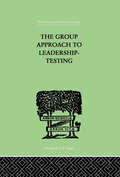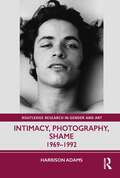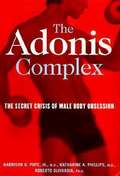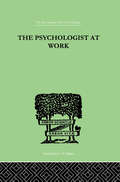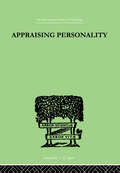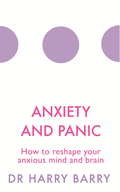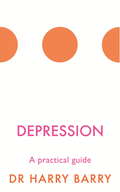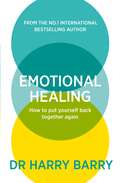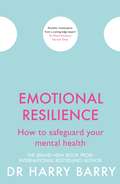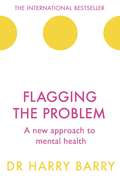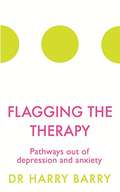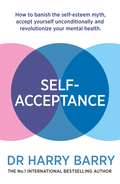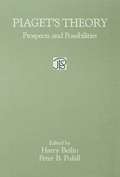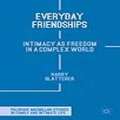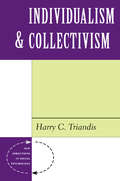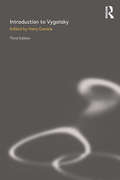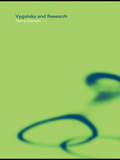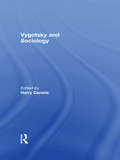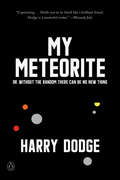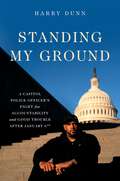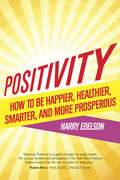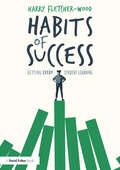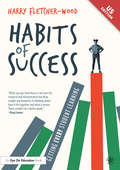- Table View
- List View
The Group Approach To Leadership-Testing
by Harris, HenryFirst Published in 1999. Routledge is an imprint of Taylor & Francis, an informa company.
Intimacy, Photography, Shame: 1969–1992 (Routledge Research in Gender and Art)
by Harrison AdamsThis study argues that intimacy requires an overcoming of shame, and each of these artists, in their own way, uses photography to frame moments that can be shameful to some and intimate others, leaving it to the viewer to navigate this affectively perilous terrain.From the cancellation of Mapplethorpe’s retrospective The Perfect Moment to the obscenity trial in Cincinnati shortly thereafter, to Hujar’s lesser-known but equally “hardcore” imagery, to Goldin’s gritty depictions of domestic violence and substance abuse, to the accusations of child pornography thrown at Mann’s photographs of her own children, the photographers at the heart of this book have probed the limits of acceptability. But there is more to their work than merely controversy; it’s what causes the controversy that matters. The notion of intimacy is at stake in some of our most important human relationships, and thus a great deal hinges on both achieving and preserving intimacy.This book will be of interest to scholars working in art history, photography and gender studies.
The Adonis Complex: The Secret Crisis of Male Body Obsession
by Jr. Harrison G. Pope Katharine A. Phillips Roberto OlivardiaDiscusses the growing numbers of men who are taking the quest for perfect muscles, skin, and hair too far, crossing the line from normal interest to pathological obsession.
The Psychologist At Work: An Introduction to Experimental Psychology (International Library Of Psychology Ser. #Vol. 106)
by Harrower, M RFirst Published in 1999. Routledge is an imprint of Taylor & Francis, an informa company.
Appraising Personality: THE USE OF PSYCHOLOGICAL TESTS IN THE PRACTICE OF MEDICINE
by Harrower, MollyFirst Published in 1999. Routledge is an imprint of Taylor & Francis, an informa company.
Dimensions of Phonological Stress
by Harry Jeffrey Heinz Rob Goedemans Van Der HulstStress and accent are central, organizing features of grammar, but their precise nature continues to be a source of mystery and wonder. These issues come to the forefront in acquisition, where the tension between the abstract mental representations and the concrete physical manifestations of stress and accent is deeply reflected. Understanding the nature of the representations of stress and accent patterns, and understanding how stress and accent patterns are learned, informs all aspects of linguistic theory and language acquisition. These two themes - representation and acquisition - form the organizational backbone of this book. Each is addressed along different dimensions of stress and accent, including the position of an accent or stress within various prosodic domains and the acoustic dimensions along which the pronunciation of stress and accent may vary. The research presented in the book is multidisciplinary, encompassing theoretical linguistics, speech science, and computational and experimental research.
Anxiety and Panic: How to reshape your anxious mind and brain
by Harry BarryTHE NUMBER 1 INTERNATIONAL BESTSELLER'Holds the key to easing the mental torture of those who have endured a lifelong struggle with the symptoms of acute and chronic anxiety. A unique book by a unique doctor' IRISH TIMESA practical guide to understanding, managing and overcoming anxiety and panic attacks by bestselling author and GP Harry Barry. Do you or does someone you love suffer from general anxiety, social anxiety, panic attacks, a phobia, obsessive-compulsive disorder or post-traumatic stress disorder? Or are you a health-care worker treating people with these disorders? Then this book is for you. Dr Harry Barry combines a deep knowledge of the inner workings of the mind and brain with a wealth of experience treating patients as a GP to offer a way out of the fear, worry and shame of anxiety. In this wise, supportive book, Dr Barry explains clearly and simply what it is about our minds and brains that generates the symptoms of anxiety. Through a series of case studies based on his real-life experiences treating patients, he explains and demonstrates how to use lifestyle changes, mindfulness, exercise and CBT techniques to cope with these symptoms and ultimately feel better.Previously published as Flagging Anxiety: How to Reshape Your Anxious Mind and Brain, this edition has been fully revised and updated.
Depression: A practical guide (The\flag Ser. #2)
by Harry BarryA practical, four step programme to help you understand and cope with depression. As many as 1 in 4 British people have depression at any one time, and despite being so prevalent in our lives and communities, there is still lingering reluctance to talk about depression and its effects. In Depression: A practical guide, Dr Barry is determined to break the silence and provide practical advice to those suffering from depression as well as their families and friends. Dr Barry reveals a simple, four step programme to deal with depression, from beginning the journey, how to feel better, how to get better and how to stay well. He explores holistic approaches involving lifestyle as well as drug therapy, talk therapy (particularly CBT) and mindfulness.Previously published as Flagging Depression, this edition has been fully revised and updated.
Emotional Healing: How To Put Yourself Back Together Again
by Harry BarryTHE IRELAND TOP 10 BESTSELLER'An intensely powerful book filled with clear tools to help us survive and cope with some of the most profound moments in our lives. Moving and thoughtful' Bruce Daisley, author of the Sunday Times No. 1 bestseller The Joy of WorkWhen we experience trauma, loss or grief the pain can feel as if it will last forever. We begin to wonder if our old selves - the ones who felt hope and happiness and joy - are lost to us. And our emotions can lead us into damaging behaviours that compound our problems.Dr Harry Barry acknowledges there is no magic wand that will take our pain away completely, but he uses his clinical experience, combined with cognitive behavioural therapy, to show that emotional healing is always possible. You can put yourself back together with the simple exercises and straightforward advice that have helped countless others.Emotional Healing is a practical, compassionate companion for anyone who feels that their emotional wounds are preventing them from fully embracing life. Learn to feel like yourself again.
Emotional Resilience: How to safeguard your mental health (The\flag Ser. #6)
by Harry BarryTHE BRAND NEW BOOK FROM INTERNATIONAL BESTSELLING AUTHOR DR HARRY BARRY.There are many challenges facing our mental health. We are living in the middle of an anxiety epidemic, depression is the one of the most significant mental health issues of our time, self-harm is endemic amongst school children and technology and social media are insidiously and pervasively invading our lives leading to toxic stress. In this book, bestselling author and GP Dr Harry Barry reveals how you can unlock your inner emotional resilience reserves, deal with the challenges of life, and protect your mental health. He explores the key skills needed to transform your emotional capacity and reach your full potential.He covers:Personal skills teaching you how to deal with self-acceptance, perfectionism, frustration, failure and success, the physical symptoms of anxiety, procrastination, problem solving and catastrophising.Social skills such as how to develop and practice empathy, read social cues and how to deal with anxiety in social and performance situations.Life skills such as how to deal with the unfairness and discomfort of life, pragmatism and conflict resolution, how to develop a work/life balance and what to do when stress comes calling.
Flagging the Problem: A new approach to mental health (Flagging Ser. #1)
by Harry BarryA practical guide to understanding and coping with anxiety, depression, addiction and suicide. Flagging The Problem: A New Approach to Mental Health investigates how the mood system in the brain and the body works, and how problems in this system contribute to anxiety, depression, addiction and suicide. Bestselling author and GP Dr Harry Barry reveals a pioneering system using a coloured flag which represents a particular mental state or area of concern: - Green Flag explains the normal mood system-The Red Flag deals with depression- The Yellow Flag addresses anxiety- The Purple Flag deals with addiction - The White Flag addresses the issue of suicide.Using this system to help readers visualise the illness and its symptoms, Dr Barry aims to provide hope to those suffering from depression, addiction, anxiety and suicidal thoughts and with it the possibility of a new life where the pain can be alleviated.Previously published as Flagging the Problem: A New Approach to Mental Health, this edition has been fully revised and updated.
Flagging the Therapy: Pathways out of depression and anxiety (Flagging Ser. #2)
by Harry BarryA practical, step-by-step guide to identify and cope with depression by bestselling author and GP Dr Harry Barry. Depression and anxiety can have a debilitating effect on sufferers and their families. However, in many cases, these afflictions can be treated and risks of recurrence significantly reduced. Applying a system using colour-coded flags for various mental states and problems, Dr Barry explains the role our minds and brains play in the manifestation of depression and anxiety, and how these in turn can be shaped to lead us out of illness. Flagging the Therapy uses relatable case studies and examines the numerous medical, psychological and complimentary therapies that can all help in negotiating a pathway out of depression and anxiety.Previously published as Flagging the Therapy: Pathways Out of Depression and Anxiety, this edition has been fully revised and updated.
SelfAcceptance: How to banish the self-esteem myth, accept yourself unconditionally and revolutionise your mental health
by Harry BarryIn an age where self-esteem is seen as essential to mental health, we are seeing unprecedented rises in mental health difficulties from depression anxiety, eating disorders and many others. Is there not a dichotomy at play here? Is Self - Esteem (ie 'I live for my rating') a reality at all or simply a myth we are all buying into. In this book bestselling author Harry Barry challenges the conventional wisdom and explores why the terms self-acceptance, self-respect and self-actualization are more helpful in developing positive mental health. In his trademark style he also provides practical examples of what we should all be doing instead to build confidence and reach our full potential.Part 1: The myth of self-esteemPart 2: Debunking the myth of 'low self-esteem'Part 3: Debunking the myth of 'high self-esteem'Part 4: Debunking the myth 'others can dictate my self-esteem'
Piaget's Theory: Prospects and Possibilities (Jean Piaget Symposia Series)
by Harry Beilin Peter PufallThis volume marks the 20th Anniversary Symposium of the Jean Piaget Society. Some of the American contributors were among the first to introduce Piaget to developmental and educational psychology in the United States, while some of the international contributors worked with Piaget to develop his program of genetic epistemology and continue to make significant contributions to it. Within this volume the possibility of Piaget's paradigm is reviewed not only as the stuff of normal science, yielding fascinating empirical questions that linger within it, but also, and more importantly, as the stuff of revolutionary science, with continuing potential to comprehensively structure our thinking about developmental theory. The constructive contribution Piaget's theory has for developmental theory emerges as four central themes in the volume: understanding the intentional or semantic aspect of mental life without abandoning the Piagetian assumption that is rational and committed to truth testing; examining mental life and its development as a dialectical relation of function and structure--a relation Piaget introduced in his study of the developmental relation between procedural and operational knowledge; exploring new and interdisciplinary perspectives on equilibration as the driving force of constructive adaptive processes; understanding social and historical forces in individual and cultural development--not necessarily as forces antithetical to Piaget's perspective but as forces that take on new meaning within his framework which avoids erroneous dichotomies such as the distinction between subjective and objective knowledge.
Everyday Friendships
by Harry BlattererEveryday Friendship conceptualises the lived experience of intimacy in a world in which the terms and conditions of love and friendship are increasingly unclear. Drawing on writing on friendship, love, and intimacy by such thinkers as Simmel and Kracauer, Elias, Goffman, Luhmann and Honneth, the book charts the modern meaning of intimacy and the freedoms it offers, as well as the continued challenges of entrenched gendered assumptions in everyday relations of affection, trust and respect. It shows that the analysis of the 'small world' of dyads can give important clues about society, and in this case about its gendered makeup. Everyday Friendship seeks to reintegrate into sociology the study of friendship and the analysis of dyads.
Individualism and Collectivism: Theory, Method, And Applications (New Directions in Social Psychology #Vol. 18)
by Harry C Triandis<p>In this, his latest book, Harry Triandis explores the constructs of collectivism and individualism. Collectivists are closely linked individuals who view themselves primarily as parts of a whole, be it a family, a network of co-workers, a tribe, or a nation. Such people are mainly motivated by the norms and duties imposed by the collective entity. Individualists are motivated by their own preferences, needs, and rights, giving priority to personal rather than to group goals.Reviewing relevant literature in philosophy, political science, anthropology, sociology, and psychology, Triandis shows how culture shapes the way we think; and he also explores the wide-ranging implications of individualism and collectivism for political, social, religious, and economic life. He makes compelling arguments for the appreciation of both perspectives, drawing on examples from Japan, Sweden, China, Greece, Russia, the United States and other countries. <p>Triandis challenges the view that psychology is universal, offering evidence for culture-specific influences on thought and action. We learn that the cultural patterns represented by individualism and collectivism lead people to view their worlds through different lenses, attaching different meanings to life events. Triandis explains how these variations in meaning can help us better understand why crime rates, divorce rates, levels of self-esteem, feelings of well-being, and indeed overall behavioral patterns can be so different from one society to another.
Introduction to Vygotsky
by Harry DanielsThis thoroughly updated third edition provides students with an accessible overview of Vygotsky’s work, combining reprints of key journal and text articles with rich editorial commentary. Lev Vygotsky provided the twentieth century with an enticing mix of intellectual traditions within an attempt to provide an account of the social formation of the mind. His legacy is an exciting, but at times challenging fusion of ideas. Retaining a multi-disciplinary theme, Introduction to Vygotsky, 3rd edition begins with a review of current interpretations of Vygotksy’s original work. Harry Daniels goes on to consider the development of Vygotsky’s work against a backdrop of political turmoil in the developing USSR. Major elements explored within the volume include the use of the 'culture' concept in social development theory, the development of means of describing social life, the concept of mediation, and implications for teaching, learning and assessment This book will be essential reading for Vygotskian students in developmental psychology, education and social sciences, as well as to students on specialised courses on cultural, cross-cultural and socio-cultural psychology, philosophical psychology, philosophy of science, history of psychology and Soviet/Russian history.
The Cambridge Companion to Vygotsky
by Michael Cole Harry Daniels James V. WertschL. S. Vygotsky was an early-twentieth-century Russian social theorist whose writing exerts a significant influence on the development of social theory in the early-twenty-first century. His non-deterministic, non-reductionist account of the formation of mind provides current theoretical developments with a broadly drawn yet very powerful sketch of the ways in which humans shape and are shaped by social, cultural, and historical conditions. This dialectical conception of development insists on the importance of genetic or developmental analysis at several levels. The Cambridge Companion to Vygotsky is a comprehensive 2007 text that provides students, academics, and practitioners with a critical perspective on Vygotsky and his work.
Vygotsky and Research
by Harry DanielsThis book provides readers with an overview of the implications for research of the theoretical work which acknowledges a debt to the writings of L.S. Vygotsky. A concise introduction to Vygotsky’s original thesis and discussions on his approach to research methods is given; this is followed by an exploration of the research practices which have arisen in fields developed on the basis of his original thesis. These include: Socio-cultural studies with a focus on mediated action; Distributed Cognition, Situated Cognition and Activity Theory. To aid understanding, chapters devoted to each area will provide excellent accounts of specific studies which illustrate the underlying methodological principles and the specific methods which are being deployed. In each case assumptions and limitations are discussed. The book concludes with some proposals for future developments at both methodological and conceptual levels.
Vygotsky and Sociology
by Harry DanielsBuilding on earlier publications by Harry Daniels, Vygotsky and Sociology provides readers with an overview of the implications for research of the theoretical work which acknowledges a debt to the writings of L.S. Vygotsky and sociologists whose work echoes his sociogenetic commitments, particularly Basil Bernstein. It provides a variety of views on the ways in which these two, conceptually linked, bodies of work can be brought together in theoretical frameworks which give new possibilities for empirical work. This book has two aims. First, to expand and enrich the Vygotskian theoretical framework; second, to illustrate the utility of such enhanced sociological imaginations and how they may be of value in researching learning in institutions and classrooms. It includes contributions from long-established writers in education, psychology and sociology, as well as relatively recent contributors to the theoretical debates and the body of research to which it has given rise, presenting their own arguments and justifications for forging links between particular theoretical traditions and, in some cases, applying new insights to obdurate empirical questions. Chapters include: Curriculum and pedagogy in the sociology of education; some lessons from comparing Durkheim and Vygotsky Dialectics, politics and contemporary cultural-historical research, exemplified through Marx and Vygotsky Sixth sense, second nature and other cultural ways of making sense of our surroundings: Vygotsky, Bernstein, and the languaged body Negotiating pedagogic dilemmas in non-traditional educational contexts Boys, skills and class: educational failure or community survival? Insights from Vygotsky and Bernstein. Vygotsky and Sociology is an essential text for students and academics in the social sciences (particularly sociology and psychology), student teachers, teacher educators and researchers as well as educational professionals.
My Meteorite: Or, Without the Random There Can Be No New Thing
by Harry DodgeAn expansive, radiant, and genre-defying investigation into bonding—and how we are shaped by forces we cannot fully know Is love a force akin to gravity? A kind of invisible fabric which enables communications through space and time? Artist Harry Dodge finds himself contemplating such questions as his father declines from dementia and he rekindles a bewildering but powerful relationship with his birth mother. A meteorite Dodge orders on eBay becomes a mysterious catalyst for a reckoning with the vital forces of matter, the nature of consciousness, and the bafflements of belonging. Structured around a series of formative, formidable coincidences in Dodge&’s life, My Meteorite journeys with stylistic bravura from Barthes to Blade Runner, from punk to Pale Fire. It is a wild, incandescent book that creates a literary universe of its own. Blending the personal and the philosophical, the raw and the surreal, the transgressive and the heartbreaking, Harry Dodge revitalizes our world, illuminating the magic just under the surface of daily life.
Standing My Ground: A Capitol Police Officer's Fight for Accountability and Good Trouble After January 6th
by Harry DunnNew York Times Bestseller The stirring memoir of Harry Dunn, a Capitol Police Officer on duty January 6th, who has become one of the most prominent and essential voices regarding the truth of that day, and &“a must-read for those care about our nation&’s future&” (Congressman Eric Swalwell). Walking the halls of democracy as a Capitol Police officer, Harry Dunn was a man slowly experiencing an awakening. It sparked after the election of our first Black president. It grew as his belief in the bravery and honor of law enforcement was shaken by Ferguson and countless other cases of police brutality towards the Black community. It continued to burn brighter as he watched members of Congress, many of whom he had befriended, lose their way to partisanship, as political extremism intensified. And it exploded into a blaze when he fought side by side with his fellow officers on January 6th, when democracy and their lives were threatened.Standing My Ground is &“a powerful, patriotic tale – told with striking moral clarity&” (Congresswoman Nancy Pelosi) that provides a crucial, definitive firsthand account of what happened on that day our country was shocked to its core. But it will also share the story of a man who refused to stay quiet when he learned that some of the men and women he had risked his life protecting, who knew him by name, would deny the horrors they faced. That&’s when he chose to speak up and to seek out what his hero John Lewis once termed &“good trouble.&” Dunn&’s ongoing story as a witness willing to meaningfully engage with the media, lawmakers, and the public provides a backdrop for examining the political and racial divide in this country—one that we must overcome in order to demand accountability and preserve our precious democracy.
Positivity: How to Be Happier, Healthier, Smarter, And More Prosperous
by Harry EdelsonHarry Edelson is the son of an illiterate Russian immigrant whose husband left the family when Harry was an infant. He begins his book this way: “I grew up in the poorest neighborhoodin Brooklyn, which was the poorest neighborhood in New York City, and I was the poorest of the poor.” <P><P>But Mr. Edelson has no intention of wasting his life or our time by lamenting his childhood or anything else. He tells us, “I consider myself to be very lucky. I have been happy all my life even though I started out as poor as a child could be.” . . . If you want to be happy, it is all in your mind. So take control of your senses, determine to be happy, and develop a frame of mind that will make you and all those around you happy.” In Positivity: How to Be Happier, Healthier, Smarter, and More Prosperous Mr. Edelson reveals his secrets and tips for success from the vantage point of a person who has enjoyed having excellent health, a wide range of knowledge from a fine academic background enhanced by self-education, and fulfilling careers on Wall Street in technology, investment banking, and later as owner of a highly successful business in capital investments. Focusing on his strong belief in continuing education to increase skills that entertain us and help our careers, he extolls the benefits of being a speed-reader and increasing memory by learning the techniques of mnemonics, and he demonstrates interesting mathematical tricks that work for him. He also has plenty of good, practical financial advice for individuals of all means; and of course he is expansive on the value of positive attitudes. Mr. Edelson believes without a doubt that you can train your own mind for a lifetime of great happiness
Habits of Success: Getting Every Student Learning
by Harry Fletcher-WoodFor students to benefit from lessons, they must attend, listen and try their best. But at times, almost all teachers struggle to manage classroom behaviour and to motivate students to learn. Drawing on decades of research on behavioural science, this book offers teachers practical strategies to get students learning. The key is students’ habits. This book reveals simple yet powerful ways to help students build habits of success. Harry Fletcher-Wood shows how teachers can use behavioural science techniques to increase motivation and improve behaviour. He offers clear guidance on topics such as using role models to motivate students, making detailed plans to help students act and building habits to ensure students keep going. The book addresses five challenges teachers face in encouraging desirable behaviour: Choosing what change to prioritise Convincing students to change Encouraging students to commit to a plan Making starting easy Ensuring students keep going Workshops, checklists and real-life examples illustrate how these ideas work in the classroom and make the book a resource to revisit and share. Distilling the evidence into clear principles, this innovative book is a valuable resource for new and experienced teachers alike.
Habits of Success: Getting Every Student Learning
by Harry Fletcher-WoodFor students to benefit from lessons, they must attend, listen, and try their best. But at times, almost all teachers struggle to manage classroom behavior, and to motivate students to learn. Drawing on decades of research on behavioral science, this book offers teachers practical strategies to get students learning. The key is students’ habits. This book reveals simple, powerful ways to help students build habits of success. Harry Fletcher-Wood shows how teachers can use behavioral science techniques to increase motivation and improve behavior. He offers clear guidance on topics such as using role models to motivate students, making detailed plans to help students act, and building habits to ensure students keep going. The book addresses five challenges teachers face in encouraging desirable behavior: Choosing what change to prioritize Convincing students to change Encouraging students to commit to a plan Making starting easy Ensuring students keep going Workshops, checklists and real-life examples illustrate how these ideas work in the classroom and make the book a resource to revisit and share. Distilling the evidence into clear principles, this innovative book is a valuable resource for new and experienced teachers alike.
